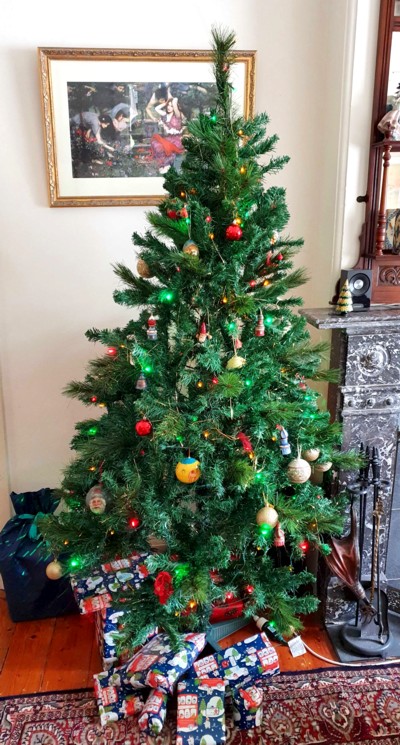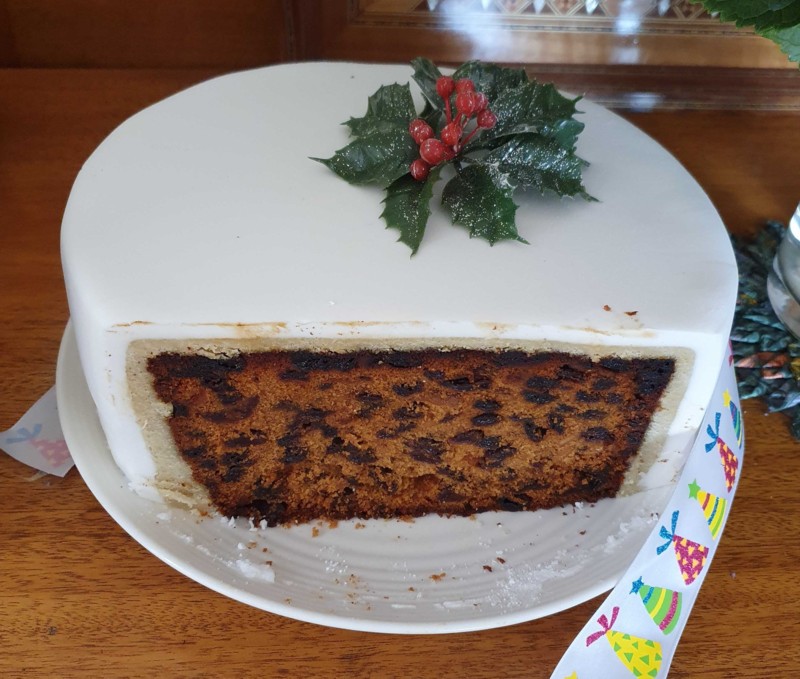It's with much optimism that I wish you all a happy festive season and a prosperous 2023, after a 'bit of a rough spell'.
To echo the late Queen, 2020 was an annus horribilis: Terrible bushfires; then Covid-19 struck; followed by floods. 2021 was not a lot better, with repeated lock-downs and no international travel. Thankfully, 2022 was much brighter in Australia (unless one lived or did business on a floodplain). It was the northern hemisphere's turn to have fires and to suffer drought.
And as I predicted at the outset, Covid-19 ceased to be a major issue - people are either dead; vaccinated; and/or have had the virus and survived. It's not quite Herd Immunity but the virus is no longer a worrying cause of death, even among those nearing the end of life.
When the virus first hit in Australia, following a mismanaged Cruise ship arrival, I was moved to speculate on how it might end.
|
Love in the time of Coronavirus Published 26 March 2020 "In the meantime I've been drawn into several Facebook discussions about the 1918-20 Spanish Influenza pandemic. After a little consideration I've concluded that it's a bad time to be a National or State leader as they will soon be forced to make the unenviable choice between the Scylla and Charybdis that I end this essay with. On a brighter note, I've discovered that the economy can be expected to bounce back invigorated. We have all heard of the Roaring Twenties. So the cruise industry, can take heart, because the most remarkable thing about Spanish Influenza pandemic was just how quickly people got over it after it passed. The history books tell us that the Roaring Twenties were a reaction to the end of the Great War. Yet the War was but one of the hurdles that had to be overcome. The Spanish Influenza pandemic was, more briefly, an enormous burden on post-war society - shutting down commerce, in the same way we are now becoming familiar with, and killing tens of thousands. Although historians disagree over the numbers all agree that the Spanish Influenza pandemic killed a great number. The lowest estimate is 17 million worldwide while another puts it at between 24.7 and 39.3 million. Most, including the National Museum of Australia and Wikipedia, tell us that over 50 million people died worldwide. Globally, this is many more than died in the Great War (WW1). For example, the United States lost less than 120 thousand to the War - then over half a million to the pandemic..." "So in the shadow of the dreadful losses in World War I, that are memorialised in our streets and parks and still remembered reverently at least twice a year, the pandemic that took many young women too, has been almost scrubbed clean from collective memory." |
The best thing this year was our ability to travel overseas again and to visit Berlin and my daughter Emily, her partner Guido and their children, Leander and Tilda. I'm pleased to report that both grandchildren have very good English, in addition to their native German (Berlin style).
Those of you who read last year's message will find what follows familiar. I've barely changed a word.
As Tim Minchin sings in White Wine in the Sun [turn on your sound...] Christmas is a time for family. So, the lyrics:
| And if my baby girl When you're twenty-one or thirty-one And Christmas comes around And you find yourself nine thousand miles from home You'll know what ever comes Your brothers and sisters and me and your mum Will be waiting for you in the sun When Christmas comes Your brothers and sisters, your aunts and your uncles Your grandparents, cousins and me and your mum We'll be waiting for you in the sun Drinking white wine in the sun Darling, whenever you come We'll be waiting for you in the sun Drinking white wine in the sun Waiting for you in the sun Darling, when Christmas comes We'll be waiting for you in the sun Waiting |
have a special meaning: I really like Christmas - It's sentimental, I know.
In the past I've been concerned about a growing movement to remove Christianity from the 'festive season' in recognition of multicultural Australia.
As my family, friends and readers know, I find religion in all its facets fascinating and I'm happy for people to believe whatever they like in the metaphysical realm, provided that they don't demand that others share those beliefs. And although I'm no longer a Christian I recognise that Christianity, more than any other modern religion, has enriched the Australian culture in innumerable ways, just as, I expect, other great religions will do in the future.
But this needs to be an additive process. Not subtractive. The human imagination is evidently infinite, so the old need not make way for the new. Thus, we still read or refer to Homer, Aesop, Aristotle; Herodotus and Vergil, despite having long since rejected their gods. I have no problem with children learning of the 'Tortoise and the Hare' or about the adventures of Odysseus or about the Wooden Horse of Troy. Plato - Socrates - remains the father of philosophy.
So I'm more than content with our traditional Christmas, this uniquely Australian blend of cultural traditions, celebrated in the heat of summer. I'm happy for school kids to perform in nativity plays. I'm happy to go to Church with friends and family. And I'm happy to play Christmas Carols at home and sometimes sing them with others in a park or around a table. I haven't found their effect on my children to be deleterious, any more than repeatedly watching 'The sound of Music' or, when a little older, attending a performance of Oedipus Rex. Indeed, without a basic understanding of Christianity or the pre-Christian ancients much of our culture becomes obscure.
Like many Australians I'm an immigrant. I arrived as an infant in 1948 with my parents. At that time, I had no choice in the matter. But since then, I've lived overseas on two extended occasions and I still have that option. Yet I choose to live in Australia because I've come to like this great project and to be a part of our uniquely Australian way of life. Celebrating Christmas in summer has become for me part of what it is to be uniquely Australian.
So, I'm inclined to say to new arrivals or to local 'politically correct' killjoys who object: "Try embracing our chosen country's rather unique traditions and ways. You may come to love them as I have. Celebrating Christmas doesn't stop us holding our own religious beliefs or from remembering and integrating our previous cultural traditions, in addition. It's richer that way."
The origins of Christmas
In Northern Europe the sun appears for only a few hours in midwinter. In midsummer the opposite is true; the night is very short. After midwinter’s night the sun begins to return and a new year is born. This is cause for celebration. For example, the ancient god Woden, after whom we name Wednesday, was celebrated at the midwinter celebrations; at which rebirth was the central theme in pre-Christian times.
Evergreens, fir trees, holly, mistletoe, decorated these festivities and the feast. Gift giving traditions, together with seasonal songs and music enlivened the feast.
Early Christians had misgivings about bacchanalian feasts and celebrations. But they needed to overthrow the pre-existing pagan beliefs. Ever pragmatic, since the theme of the mid-winter festivals was rebirth an obvious strategy was to establish the celebration of Christ’s birth to correspond with it; and to add some 'corroborative detail, intended to give artistic verisimilitude to an otherwise bald and unconvincing narrative' in the form of additional myths and music.
But by the 16th century biblical scholars pointed out that Jesus had not been born at Christmas time and the whole event was of dubious provenance: it should be considered a pagan throwback. For a period, Christmas was banned in Northern Europe and ceased to be a holiday in many countries.
When Dickens wrote ‘A Christmas Carol’ he was in part attempting to revive a festival that had seen better days.
Christmas received a considerable boost in the 20th century when it became central to the new arts of marketing and retailing; as consumption, rather than production, became the driver of the industrial and post-industrial economies. Now Christmas creates peak sales and is the height of the retail year. A failed Christmas sales period is a failed economy.
This new Christmas was heralded in the 1931 by the Coca-Cola Company when Christmas cheer became the centre of one of their most successful marketing campaigns; giving us the new red and white Santa to replace the old ‘Green and fur’ Father Christmas or St Nicholas of earlier times.

Our Christmas Tree
A Christmas Tree remains a symbol of these pre-Christian traditions and couple of years ago I bought a new one. The old one was thirty years old. I inherited it from my parents.
It was under that tree that my infant children and their cousins played, and collected their presents, when we visited my parents at Christmas. But alas, it had become very shabby. Those same children mocked it as a sad shadow of the one of distant memory; when it was vast and glittering; towing above them; a thing of wonder.
Eventually, like changing a car, I went out and with some enthusiasm bought a new Tree. In the same spirit I refreshed the tree decorations; saving only those with sentimental value; or that could still pass for new.

2021 tree with a few of the family gifts wrapped and ready
The big blue one is from Emily - ordered in Germany - but I suspect local - it clinks!
Family Traditions
There was a time when I would not have had an artificial tree.
When we were very young our father would arrive home magically with a six-or-seven-foot branch from a fir tree. This would be stood in a large plant pot then ‘chocked- in’ with blocks of wood then sand to hold it vertical. A branch is always asymmetric and the lesser side was turned to the wall.
The whole family would decorate it.
Daddy’s job was the lights. Before commercial lights were available; or perhaps when they were too expensive; he made the string of lights by soldering little screw sockets, that took small 6V globes of the kind used in radios to illuminate the dial, to lengths of wire. Around each bulb, coloured cellophane was held with a little rubber band. To avoid electrocution, or fire, these ran to a low voltage transformer in a box, also home-made.
Many decorations were hand made too: from wool; paper; cardboard or papier-mâché. Handfuls of popcorn or lollies were wrapped in coloured cellophane or coloured crepe paper. Paper ropes, made by repeatedly folding two paper streamers together; complimented precious commercial decorations: tinsel and fragile balls of eggshell thin glass.
When commercial coloured ‘acorn’ lights became available a new ritual arose: finding the bulb that had blown. This involved using a spare bulb, that was believed to be working, to replace in sequence each bulb in the string until the lights came on again.
As Peter and I got older it was our job to harvest the fir tree branch, which would become our Christmas tree, from the bush. This required rope and a saw and our combined aesthetic, climbing and sawing skills. I have a photograph somewhere of one such branch being dragged up the hill by our dog, Blacky, in harness.
When the 'bush' became a park, self-harvesting became (more?) illegal. Commercial growers stepped in and soon it was ‘little America’ with Scouts and other charities distributing the soon to be dead, purpose grown, dense, symmetrical trees that now litter the pavements every year; and become carbon dioxide or land-fill a few days after Christmas.
Later when the fun, and investment of pre-TV holiday time, in finding our own tree and making our own decorations was gone, we reluctantly acknowledged that the tree is symbolic and could be artificial. We consoled ourselves with the knowledge that an artificial tree is almost endlessly reusable; saving a vast diversion of rural production, conspicuous consumption and unnecessary garbage generation.
For many Australians this is a time of tradition; when we remember our European and Christian or perhaps other religious heritage. It’s about family and ancestry and the ghost of lost traditions and beliefs. It's why I want black pudding for breakfast on Christmas Day and a good malt a little later; struggle with haggis when in Scotland; and like a pint of Guinness or Newcastle Brown as appropriate.
On one side of our family gifts are distributed on Christmas Eve as in Northern Europe. On the other they are distributed on Christmas day. We all celebrate Christmas with Ham and Turkey and cake and pudding and mince pies and Christmas carols; in the middle of the Australian summer; even when most of my extended family are not even practicing Christians.

One of four 2021 Christmas cakes - I did my annual cook-a-thon again this year.
This one already sampled with friends, Craig and Sonia, over an after-dinner drink
So, when I put up and light the Christmas tree I find myself contemplating the ideas that hang upon it with each colourful bauble.
The tree represents tens of thousands of years of accumulated tradition and culture on which hangs: a green Father Christmas for its pre-commercial past; an elephant for the ancient traditions; little angels for religions past and present; a bell and gold star that evoke my parents and my own childhood; and lots of sparkling baubles for our children and theirs.
And so, to end, here is a song by Tim Minchin that sums this up:
| No responsibility is accepted for linked third party video or media content - see Terms of Use and Copyright. |
A so to my family, friends and readers: 'A merry Christmas to everybody! A happy New Year to all the world,' (as Dickens' reformed Scrooge declared on Christmas morn).

